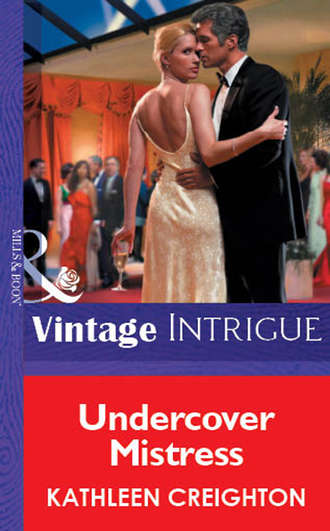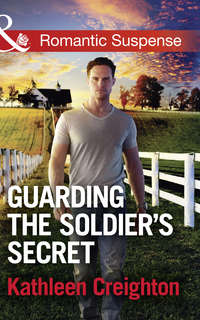
Полная версия
Undercover Mistress
Celia hurried to comply, but discovered it was easier to say than do. Picking up his feet failed to raise the man’s butt so much as an inch off the sand. Finally, she managed to achieve her desired purpose by planting herself between his legs and hooking her arms just above the knees, then hoisting them up high enough to rest on the top curve of her hips.
“Good…Lord,” Doc gasped as they staggered back up the beach with their burden, “the guy’s heavy—must weigh one-eighty, at least.”
Celia, still trying to keep the middle third of the man’s body from dragging on the sand, had her jaws clenched tightly shut and didn’t reply. Clearly, carrying a grown man’s deadweight, even for two people, was a lot harder than they made it look on TV. She also decided she must have seriously underestimated the distance between her house and that pile of driftwood and kelp. Surely, no NFL team ever labored longer or harder to traverse a hundred yards of ground.
Still, somehow, after stopping several times on the way to grab, breathlessly cursing, at painful gulps of cold, astringent sea air, Celia caught sight of the carriage lanterns’ rusty glow through the fog. Doc, she noted, was wheezing alarmingly as he hitched himself backward up the steps leading to her deck.
“You okay?” she asked, gritting her teeth and sweating rivers in spite of the cold. “You know…it’s gonna kind of…defeat the purpose…if after all this…I have to…call 911…for you.”
“Don’t worry about me,” Doc grunted. “Just…wouldya try not to crack the guy’s backbone on these damn steps? Are you looking for a lawsuit?”
Celia snorted—and was appalled when the snort turned into laughter. Where that had come from, she had no idea—stress reaction, she supposed. Here she was carrying half of a man’s deadweight—oh, bad word choice, Celia!—in her arms, for God’s sake. A seriously wounded man, moreover, and God only knew how he’d gotten that way. What she really wanted to do right then was collapse on those steps and give in to a colossal fit of the shakes.
But, of course, she couldn’t. Wouldn’t. Not now. Not yet. She clamped her teeth together and set her jaw and from some unknown storehouse found strength to take one…more…step.
Then, miraculously, they were in Celia’s living room. In a half crouch, managing to maintain her hold on the man’s legs, she reached behind her to pull the sliding door shut, and all at once it was warm and dry and still. The surf thunder became a distant whisper beyond the glass and the fog.
“Where do you want him?” Doc’s question was a gasp.
Celia didn’t answer. The lights she’d left on in the room were low and soft, but they were enough to give her a good look, her first clear look, at what she’d been carrying so blithely, so casually. Something clenched inside her, and her body went cold from the inside out.
She whispered soundlessly, “Oh, my God…”
Out there in the dark and the fog, he’d been only…well, a body. A human being, obviously. A man, sure—but anonymous. Impersonal. Even not quite real. But now…oh God, now he had a face. An arresting face, even by the standards Celia was accustomed to—Hollywood standards—with strong bones and symmetrical features. Awake and healthy, she thought, he’d probably be a very handsome man. Though matted with sand, she could tell his hair was dark, and so was the beard stubble that covered his chin and jaws and nicely chiseled upper lip. Dark lashes made crescent shadows on his cheeks. She wondered what color his eyes would be.
The hair on his body was dark, too, and frosted with sand…clotted with sand that was mixed with something darker in two places—one low on his side, the other, larger and less evenly defined, high on his chest, above the bulge of pectoral muscle and below the collar bone. His skin must be deeply tanned, she thought, for his deathlike pallor to have turned it such a dreadful shade of gray.
He was a person. A badly hurt person. A person even she could see was in real danger of ceasing to be one, forever.
“Celia, love…” Doc prompted. There was a note of desperation in his voice.
She shook herself. “Yeah, well…I suppose…” She hesitated, chewing her lip while she tried to think. Dammit, there really was no choice. “My bedroom—”
“No way I’m climbing those stairs. Perhaps the couch? It’s going to be the floor, if you don’t make up your mind quick.”
“My bedroom’s downstairs,” Celia said shortly, nodding toward the hallway beyond the stairs. “The den-slash-guestroom’s upstairs now. I had to move after the accident.” Her lips twitched wryly. “Tough to climb stairs with two broken legs.”
“Ah. Yes. Right. Okay, fine. Lead the way.”
The doctor shuffled sideways, Celia changed places with him in a clumsy do-si-do, and together they managed to maneuver the unconscious and increasingly cumbersome body down the hallway and into the room that at one time had served her as an office, library, memorabilia storage closet and guest room. Now, the queen-size adjustable bed she’d had installed after the accident occupied a great deal of it, along with a comfortable leather armchair that had belonged to her father, a huge plasma screen TV set, and the bookcases and glass-fronted cabinets that held the things that were most precious to her—books and photographs, of course, her three Daytime Emmys, and the assortment of odds and ends, ranging from priceless to quaint to totally silly, sent or brought back to her from movie locations all over the world by her legendary parents. Only the desk and the computer, which she’d never used much anyway, had been banished.
Now, Celia hoisted her burden’s sagging midsection onto the armchair, draped his legs over the wide, curved arm and left Doc to hold up his half while she hurried to turn on lamps, remove the assortment of throw pillows and fold back the lavender velvet comforter that covered her bed.
Resisting a nervous and completely uncharacteristic housewifely impulse to tug and tuck and straighten, Celia turned and regarded the limp form draped across the chair. “I don’t know, do you think we should try to get some of the sand off of him first?” Now that the man was actually in her room, she was beginning to have serious doubts, cold-crawly-under-the-skin, lead-weight-in-the-stomach doubts, about what she’d just done.
Doc gave her a withering look. “Dear heart, if we don’t get the poor fellow warmed up and some fluids into him and that wound tended to now, sand is going to be the least of your worries. Come, come—pick up your end and let’s get him into that bed—and do try not to jostle him any more than you have already. Don’t want to get that wound bleeding again. Assuming he’s got any blood left in him…”
Sand…and blood. In my bed. Great. Letting out her breath in a determined gust and steeling herself against an unreasonable and queasy reluctance to touch that chilled flesh again, she thrust her arms under the man’s legs. Which she couldn’t help but notice were bony and muscular, with not an ounce of fat on them, and moderately adorned with coarse dark hair. Quite nice legs, actually; under different circumstances she’d even have said they were attractive.
“Celia…love—”
“Okay, okay.” She braced herself and lifted, took two shuffling steps with her ungainly burden, heaved, lifted and dropped it. Then she straightened and stood staring down at the incredible sight before her: the dusky-skinned, sand-encrusted, battered and bruised body of a man, sprawled on her clean white delicately violet-sprigged sheets.
Doc Cavendish, unimpressed by the strangeness of the vision, shoved her briskly out of the way and bent over the injured man, lifting an eyelid, feeling for a pulse. Throwing her a glance over his shoulder, he snapped, “Bleeding seems to have stopped. Hypothermia’s the most critical condition. More blankets—electric, if you have one. Heating pads. Hot water bottles. Failing that, you might soak some bath towels in hot water, wring them out and bring them to me. Now—chop-chop!”
Celia’s heart was pounding, her insides quivering with a strange excitement as she hobbled up the stairs, snatched blankets and comforters from the linen closet there, then carried the pile down the stairs to her room where she dumped it on the armchair. In the downstairs bathroom, across a narrow hallway from the room she’d taken over as her bedroom, she grabbed an armload of towels and, from under the sink, the flat rubber hot water bottle she’d brought home with her from the hospital and never used again. She ran the water scalding hot and filled the bottle, then dumped the towels in the shower and left the water running over them. They were beginning to send up billows of steam as she ducked back across the hall.
Out of breath, she watched Doc slide the rubber bottle inside the cocoon of blankets that now encased the unconscious man. “Shall I…I don’t know, boil some water?”
He gave her a sardonic look as he straightened. “He’s not a lobster, dear heart. Warm will do. Plain water, tea, bouillon, chicken soup, I don’t care—just get as much warm liquid into him as you can whilst I go and fetch my doctor stuff.”
Celia whirled to stare at his retreating back with alarm. “But—but…you’re not going to just…leave me here with him! What shall I do if he…if he—”
“If he dies?” Doc looked back at her, his jowly cheeks creased in a weary smile. “I’d be greatly surprised if he did, considering what he’s already survived. Don’t worry—I’ll be back in a jiff.” And he was gone.
With a frustrated whimper and one last wild look at the blanket mound on the bed, Celia headed for the kitchen, where, like the character she’d played for so long on one of the world’s most popular daytime soaps, she proceeded to follow the doctor’s orders. “Nurse Suzanne, another unit of O-neg—STAT!”
And, she fervently reflected as she filled a mug with hot water, dropped in a couple of bouillon cubes and set it in the microwave, she’d give just about anything right now for a few of those units of O-neg, not to mention the actual skills and training to know what to do with them.
Back in the den, she placed the mug of steaming broth on the nightstand, then took a deep breath and sat down gingerly on the edge of the bed. The mound of blankets beside her remained still as a corpse, and when she touched it, felt cold as one, too. Oh, God…I don’t want to do this!
Okay—she’d asked for this. It had been her idea to bring the guy here, right?
She hitched herself around until she was braced by the pillows piled against the headboard—carved mahogany, hand-carved in someplace exotic, India, maybe, she’d forgotten exactly where—that had been her mother’s. With a considerable amount of wriggling around, she managed to get herself wedged behind the unconscious man’s shoulders so that his head was propped on her chest.
His head…on her chest. Cold, damp, sand-crusted hair pressed against her bare skin…her bra…her breasts.
Suppressing a shudder and closing off that part of her mind, she stretched out her arm, groped for and found the mug. Carefully, she lifted it—and nearly let it slip from her fingers when she felt a moan vibrate through the man’s body. It seemed to penetrate through his skin and straight into hers.
She froze, quivering inside. She could feel her heart hammering against the cold, muscular back, feel the weight of that back pressing sand grit into her skin. His head rolled on her shoulder, sending new shock waves through her. She heard the faintest of whispers and, bending her head close to his lips, once again felt that stirring of air across her cheek.
“It’s all right,” she managed to say in a broken, gasping voice. “You’re safe now.”
“Max…”
“Yes, yes…it’s okay,” she murmured, soothing him while her mind was shrieking, Who the hell is Max? “Don’t try to talk—”
“Max…Max!” She could feel powerful muscles tense as he struggled to lift his head. A terrible shudder racked his body. Words like ground gravel strained to escape from jaws gone rigid as stone. “It’s…boats, Max. Could kill…millions. Don’t tell anyone. They can’t know!”
Fear rushed through Celia like a blast of cold wind.
Chapter 2
One month earlier:
“Boats…” Roy Starr dropped the word like a lead weight into the silence as he stared across the vastness of the city that slumbered beneath an indigo blanket bejeweled with a billion points of light. Out there where the lights ended lay the Port of Los Angeles, one of the largest, busiest seaports in the world. Every year, millions of tons of cargo moved in and out of the harbor, on uncounted thousands of ships.
The man beside him, shorter by half a head and slighter by fifty pounds, aimed his gaze in the same direction and nodded. “According to the chatter, that’s where the next attack’s gonna come from. Not by air this time. By boat. What’s that line from…whoever it was—‘One if by land…two if by sea…’”
“Longfellow—‘Paul Revere’s Ride,’” Roy said absently. He’d been raised by a Georgia schoolteacher, so he knew those kinds of things. He glanced at his handler, the man he knew only as Max, and frowned. “They been able to narrow the target any?”
There was the hiss of an exhalation as Max pivoted and leaned his backside against the fender of his car. “Most likely west coast. That’s all they’ll say at the moment. Likely timed for the Christmas or New Year’s holiday, for maximum impact. We’ve stepped up security on the main ports of entry—Seattle, Portland, San Francisco, Los Angeles—checking all container ships from point of departure on, screening for radiation, and so on. We feel we’ve got the big ones covered pretty well.”
“Then…”
“It’s not the big ones we’re worried about.” Max paused. “You saw that segment on 60 Minutes a while back?”
Roy nodded, his lips twisting in a smile without much humor to it. “Yeah, I wish they’d quit giving the terrorists ideas.”
Max snorted. “I doubt there’s anything they could come up with Al-Qaeda hasn’t already thought of. This one, though…” He paused again, and Roy wondered whether it had been his imagination or whether a shiver had just passed through the man’s body. “Think about it—how many small-boat harbors do you suppose there are between San Diego and Santa Barbara? How many private fishing boats…yachts…sailboats? Wouldn’t take a very big one to carry a biological or chemical agent into a marina. With the right wind conditions…” His voice trailed off.
Roy nodded, fighting a wave of nausea. In Los Angeles, unless there was a storm moving down from the Gulf of Alaska, or the Santa Anas were blowing, the prevailing breeze blew from the west, straight in off the Pacific. It wouldn’t take much of one to carry a killing cloud into the basin, where eight million innocent souls lived and worked…and slept. “Jeez,” he said.
After a long, cold silence, he took a breath. “You must have a lead, or you wouldn’t have called me.”
Max straightened up and nodded. “Not sure you’d call it a lead. One name keeps popping up more often than it should. Abdul Abbas al-Fayad—know him?”
Roy frowned. “Sounds sort of familiar. Where’ve I—”
“He’s been on the watch list for a while, but you’d probably know him from the tabloids. Made the news a few years back when he bought a mansion in Bel Air from some old-time famous movie star, then proceeded to annoy the hell out of his neighbors when he turned the place into a cross between the Playboy mansion and something out of the Arabian Nights.”
“Oh, hell yeah, I remember—painted all the naked statues so they were anatomically correct, didn’t he? Something like that?”
Max nodded, his lips twitching in a smile without amusement. “Outraged his royal relatives back home, too—not exactly the accepted role model for an Arab crown prince, I guess. They disowned him—not that it slowed him down any. Abby—as he’s called—is a billionaire in his own right.”
Roy made a derisive sound. “The guy’s hardly a terrorist. He’s a playboy. And a nut.”
“A playboy…” said Max, and paused meaningfully before adding, “…with a boat.”
“Ah.”
“A helluva big boat. One of those megayachts—the Bibi Lilith, which I’m told translates as ‘Lady of the Night’—I swear to God. Do you suppose he knows what that means in English? Anyway, the damn thing looks like the Queen Mary. Over three hundred feet long and luxury all the way. Twenty guest cabins in addition to the main stateroom, and a crew of thirty.”
“Uh-huh,” said Roy, in a neutral tone.
Max gave him a sideways look. “Don’t you skipper a fishing boat? Something like that?”
“Yeah, I do,” Roy said, thinking, with a sudden sharp twist of longing, of his beach house on Florida’s Gulf Coast, and his boat, the Gulf Starr, which was currently in the capable hands of his best friend and business partner, Scott Cavanaugh. Scott had recently and unexpectedly become his brother-in-law, too, thanks to his recent marriage to Roy’s sister, Joy—something he was still having some trouble getting his mind around.
“What’d you do, get me on this boat’s crew?” He was thinking this assignment might have a definite upside, in spite of the grim nature of its purpose.
“Wish we could, believe me. Problem with that is, you’d have to infiltrate the guy’s inner circle, and they’re a close-knit, suspicious bunch—mostly related, and even that doesn’t mean they trust each other. Even if we could manage to pull it off, it would take time—a whole lot more than we’ve got.” Max was gazing at the distant harbor lights again. There was another pause, and then: “Your dad used to own a big rig, right?”
Wary, now, wondering what Max was getting around to asking of him, Roy nodded. “That’s right.”
Max let out a breath. “I hope to God he taught you your way around a diesel engine.”
“I’ve turned a wrench or two in my time,” Roy said. He didn’t mention the fact that his father had died too soon to have taught him much of anything, and that what he knew about diesels he’d mostly learned from his brother, Jimmy Joe. That, and trial and error.
Except, there wasn’t going to be any room for error here. In his current line of work, an error most likely meant people—a lot of people—were going to die.
“So, you’re thinking about…what, sabotaging an engine?”
Max’s teeth flashed bluish white in the artificial light. “Can you think of a better way to get you on board? They call for a mechanic—”
Roy shook his head. “Tough to jimmy up a diesel—at least, bad enough to need a technician to fix it.”
Max gave him a long look. “I know you’ll think of something,” he said as he turned back to the vista.
There was a long silence. Then Roy asked, in a voice so careful it could have been mistaken for indifference, “Any plans to raise the alert level?”
Max’s reply was a puff of air too muted to be called a snort. “Again? Unless we have something specific to tell ’em, who’s gonna pay attention?” He turned abruptly and tapped Roy’s chest with an index finger. “We need surveillance on that boat. We need something specific. If Abby…” His voice trailed off. He shook his head, once more scanning the sea of lights.
“Even if we knew for certain, what good would it do to tell them? Look at ’em down there. Ten million people. What do you think they’d do if they knew a cloud of death was heading their way? Can you imagine it? Jeez…”
For a long moment there was silence, and the balmy Southern California autumn night seemed to grow colder. Then Max said softly, “Whatever it takes, we have to keep a lid on this thing. Let’s find out where this is coming from, but for God’s sake, don’t let it get out we’re even close to looking at this guy. Abby’s a media magnet even under normal circumstances—surrounds himself with the biggest names in showbiz and politics. If even a hint of this were to hit the media…” He caught his breath, then growled, “They can’t know. Understand? Nobody…can know.”
When the shivering started, Celia did the only thing she knew how to do: She wrapped her arms around the injured man’s body and held him, rocking him like a baby and whispering, “It’s okay…it’s okay…I’ve got you…shh…I’ve got you.”
“Ah, those maternal instincts,” Doc said in his dry, ironic way as he came into the room. He was carrying a scuffed leather bag which he placed on the armchair next to the bed. “Can’t keep ’em buried forever, can you, love?”
“He was shivering,” Celia snapped, glaring up at him. She felt a bit foolish, now that her backup had returned, although perhaps rather in need of some soothing and mothering herself, after what she’d just heard. Except her chills, her shivering, were all hidden inside.
Don’t tell anyone. Nobody…can know.
Who in the world is this guy? Babbling about bombs and death and luxury yachts…
Oh, God, what have I gotten myself into? Why didn’t I do the sensible thing and call the cops when I had the chance?
She still could, she supposed, only how was she going to explain what the guy was doing here, in her house? In her bed?
She was once more acutely aware of the weight of the cold, hard body pressing against her, the grittiness of sand, the sharp, sea smell of his hair. He was muttering unintelligibly through pale lavender-colored lips that barely seemed to move, and shivering less violently, now, in fitful bursts. Was that a good thing or a bad thing?
“Has he said anything that might tell us who he is?” Doc casually asked, glancing at the man’s face as he bent over him, his fingers monitoring pulse beats.
Celia shook her head. “Nothing I can make out,” she lied, repressing a shudder. And then, reconsidering a little, “He keeps talking about somebody named Max.”
“Hmm…” Doc folded down the top edge of the blankets and frowned at the ragged wound high on the man’s chest. Even from her position, wedged behind the injured man’s broad shoulder, Celia could see that the crater was glistening with new, red blood. “Friend, family…lover?”
“I don’t think so,” she whispered. The cold hollow place inside her had just gotten bigger.
Okay, Max, this was my bright idea…I hope to God it works.
Silently cursing the circumstances that had him clinging to the hull of a superluxury yacht in the cold, dark Pacific, Roy rode the gentle swell outside the marina’s breakwater and listened to the mutter of voices far above his head. The security guards were making their rounds…right on schedule. He’d clocked them three full rotations and they hadn’t varied their routine. This time he was going in.
The voices faded, blending into the shush and sigh of the waves. Roy glanced at the greenish numbers on the face of the chronometer on his wrist and patted the waterproof packet taped to his chest inside his wet suit. The packet contained a chip roughly the size and shape of a postage stamp, and it would be his job to install it in the motherboard of the computer panel that controlled and monitored the yacht’s three big—and, according to their schematics, virtually indestructible—diesel engines. According to the yacht manufacturer’s blueprints he’d committed to memory, the computer was located in the central control room, essentially a locked vault deep in the bowels of the yacht, near the engine room.
Amazing, he thought, that such a tiny thing could bring those engines to a standstill. Even better, the cause of the problem would be almost impossible for anyone but a technician to detect. Any call for such a technician would, of course, be intercepted by Max, who would immediately dispatch—who else?—Momma Betty Starr’s little boy, Roy, who would then have convenient access to virtually every nook and cranny of the Bibi Lilith. If any WMDs of any kind were being transported in this yacht, he’d find them.
Unhooking a device that resembled a medium-size firearm from his belt, he aimed it upward and pulled the trigger. A thin smile of satisfaction curved his lips when he heard a soft thunk from somewhere on the deck above his head.
Moments later, he was ascending rapidly and silently, hand over hand, toward the starless, milky sky.
Piece o’cake.
“That’s about all I can do for him,” Doc said, closing his medical bag with a snap. “The rest is up to him—and you, I suppose. Keep those warm towels coming, and do try again to get some hot liquids into him.”








